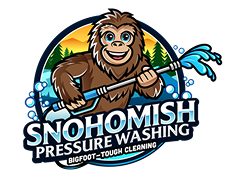Oil and grease stains don’t just look bad, they stick around.
From driveway drips to garage spills, these messes can be stubborn and unsightly. At Snohomish Pressure Washing, we offer a smarter, safer way to clean them up. Using a plant-based enzyme treatment, we help nature do the work, accelerating the growth of native oil-eating bacteria that break petroleum-based stains down into water and CO₂.
It’s effective, eco-conscious, and surprisingly satisfying — even if the stain’s been there a while.
Bigfoot-tough cleaning. Small town service.
How it works
We apply a plant-based enzymatic cleaner designed to feed and accelerate the native bacteria already living in your concrete. These bacteria naturally digest hydrocarbons — like oil, grease, and fuel — turning them into water and carbon dioxide. It’s an eco-friendly solution that helps your surface restore itself with minimal impact to your property or the planet.
We pair this process with gentle pressure washing to lift loose surface contaminants and rinse away degraded residue.
What to expect
Some stains — especially older, deep-set ones — will likely never disappear completely. But this process dramatically lightens the stain’s appearance, reduces discoloration, and eliminates oily residue at the surface. The enzymatic treatment continues working even after we leave, improving the look over time.
If we don’t think the process will make a meaningful difference, we’ll tell you that up front.
What we can treat
- Engine oil drips and leaks
- Gasoline and diesel spills
- Hydraulic and brake fluid stains
- Grease from BBQs or equipment
We also treat stubborn rust stains
In addition to oil and grease, we offer targeted removal for rust stains, the orange-brown streaks often caused by metal patio furniture, irrigation systems, or fertilizer runoff. These stains penetrate deep into porous surfaces and don’t respond to standard cleaning methods.
To treat rust, we use a specialty chemical solution formulated to break down iron-based discoloration at the surface level. This process is separate from our enzyme-based oil cleanup and requires a different technique and safety considerations.
If you’re unsure whether a stain is oil, rust, or something else entirely — we’re happy to take a look and recommend the right approach.
Where we offer this service
- Home driveways and garages
- Patios and walkways
- Commercial loading zones and parking pads
- Food service and trash bin areas
- City sidewalks and utility spaces

